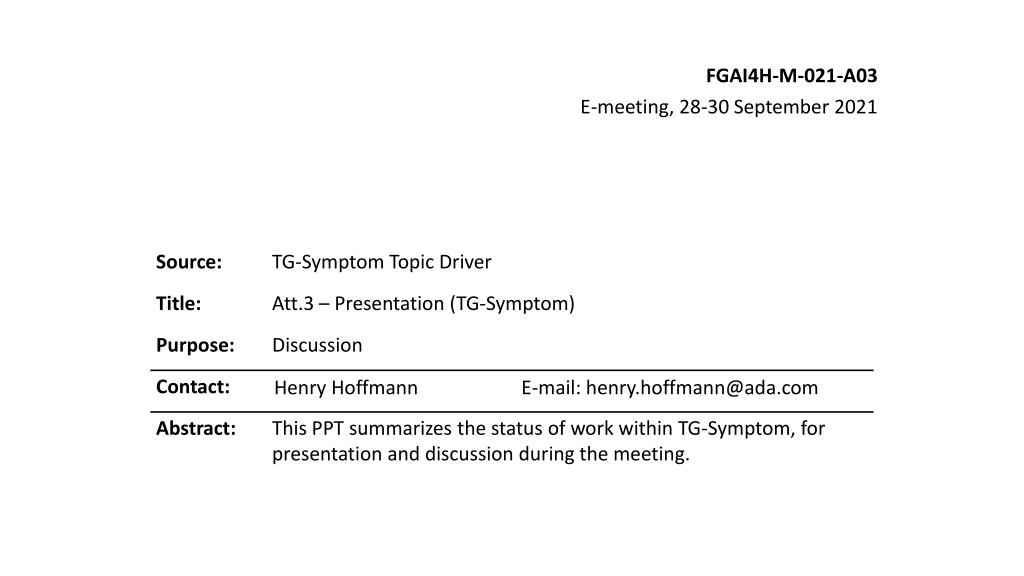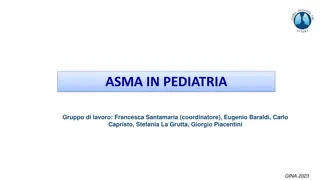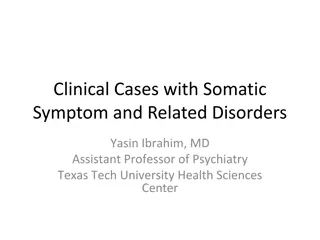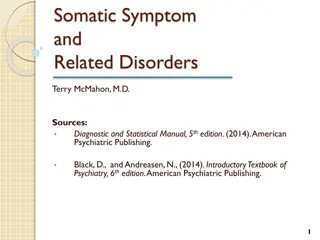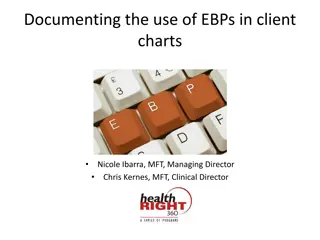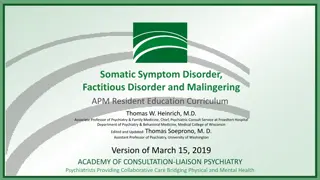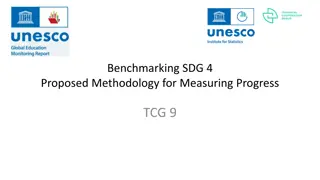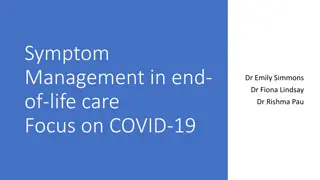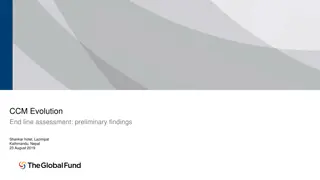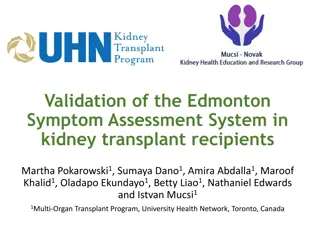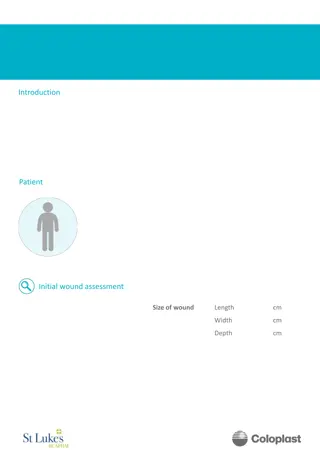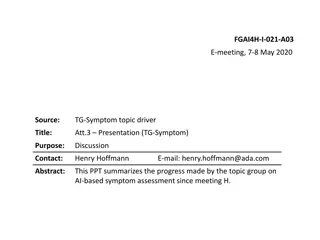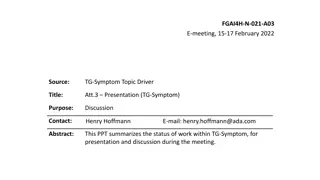Progress Report on AI-Based Symptom Assessment in Healthcare
This report provides an overview of the advancements in AI-based symptom assessment for healthcare applications. It covers the discussion points from the recent e-meeting, presentation updates, and the current status of benchmarking systems and ontology work within the Topic Group Symptom. The focus is on utilizing AI technologies to enhance pre-clinical triage, differential diagnosis, and patient care recommendations.
Download Presentation

Please find below an Image/Link to download the presentation.
The content on the website is provided AS IS for your information and personal use only. It may not be sold, licensed, or shared on other websites without obtaining consent from the author. Download presentation by click this link. If you encounter any issues during the download, it is possible that the publisher has removed the file from their server.
E N D
Presentation Transcript
FGAI4H-M-021-A03 E-meeting, 28-30 September 2021 Source: TG-Symptom Topic Driver Title: Att.3 Presentation (TG-Symptom) Purpose: Discussion Contact: Henry Hoffmann E-mail: henry.hoffmann@ada.com Abstract: This PPT summarizes the status of work within TG-Symptom, for presentation and discussion during the meeting.
Meeting M Update for the Topic Group Symptom Assessment E-meeting, 28-30 September 2021
AI-based Symptom Assessment Mobile/Web Applications sometimes called Symptom Checkers that Allow users to enter (INPUT) Patient information (age, sex, ) Current presenting Complaints (symptoms, free texts ) To then engage in a dialog similar to a doctor collecting (INPUT) Additional symptoms, findings, factors, attributes, (lab, imaging, genetics, ) To finally provide the user with (OUTPUT) Pre-Clinical Triage (emergency, see doctor today, self-care ) Differential Diagnosis (disease A 93%, B 73% - e.g. in ICD10, SNOMED CT) Additional diagnostic tests to perform, treatment advice, explanations
Journey & Approach Meeting A to C Geneva, 25-27 September 2018 A-020: Towards a potential AI4H use case "diagnostic self- assessment apps" Topic Group created Meeting F Zanzibar 2-5 September 2019 First benchmarking with toy AI & toy Data Minimal Minimal viable Benchmarking MMVB 1.0 Meeting G K Adding technical details to benchmarking and model MMVB 2.2 work completed Meeting K M , Work on approach and tools for encoding benchmarking cases using a shared ontology (ongoing)
Status of the Benchmarking System General approach Starting with toy AI and toy data to build a benchmarking system Stepwise incrementation of the complexity MMVB 2.2 Finished Based on the Berlin Model Special focus on Attributes + Factor distributions Benchmarking platform Django Backend JS React Frontend Annotation Tool Toy Ais Ada, Babylon, Infermedica, Your.MD (all cloud hosted) Implementation work paused Given the impressive progress by the open-code initiative we see this as the best option for the TG-symptom benchmarking
Status of the Ontology Work Every Topic Group member has an own Benchmarking System Essential for development work Similar metrics Similar cases Completely different encoding of symptoms Core Task of the Topic Group Agree on how to encode case data for benchmarking Simple for diseases Possible for symptoms/findings Difficult for attributes
Status of the Ontology Work Focus on improving the symptom search in the annotation tool Meeting for discussing the learnings form the first version Decision on how to improving symptom search (e.g. synonyms, all the usual search engine heuristics) Reminder: Finding the right concepts among the >100000 often quite similar - concepts is the most important feature for case encoding Direct connection to snowstrom server hosting a SNOMED CT Separation in concept list and hierarchy view (without hierarchy Preparing attribute editor Replacing tag-editor with separate lists for different evidence types Online cooperation Moved project to github Started using ticketing system there
Status of the Non-Technical Work TDD related work Update on ontology work Chapter 8 regulatory started Describing some more AI outputs Updating details to latest developments (relevant literature, system details, etc.) Other FG Interaction Cooperation with audit group started Audit team: Carolin Prabhu (Regulatory Expert), Bastiaan Quast (Software Platform Expert / Audit Developer), Marta Lemanczyk (Ethical Expert), Frank Klawonn (ML Expert) Invite/doodle sent for kick-off in the next 2 weeks
Next Steps Continue Ontology Work Continue work on SNOMED based case annotation tool Explicit attribute encoding Negation handling (no neurological signs) Testing/iterating the tool by creating cases in the group Connection with a benchmarking system Mapping to toy-AI and real AIs internally (maybe switching to FHIR) Audit Cooperation Onboarding meeting(s) Explore how to run the benchmarking with cloud hosted AI Explore connection to the annotation tool work stream TDD & Outreach Continue TDD Chapter 8 (regulatory) Responding to e.g. questionairs from WGs Ethics review, glossary sync, etc.
General Status of the Topic Group Topic Group Members: Companies (18): 1DOC3, Ada, Babylon, Baidu, Barkibu, Buoy, Deepcare, Infermedica, Inspired Ideas, Isabel Healthcare, mfine, MyDoctor, Nivi, PNP, Symptify, Visiba Care, xund.ai, Your.MD (healthily) Independent contributors (7): Reza Jarral, Thomas Neumark, Muhammad Murhaba, Pritesh Mistry, Alejandro Osornio, Salman Razzaki, Yura Perov fgai4htgsymptom@lists.itu.int (109) 7 Online meetings since meeting L (All with minutes/protocols in SharePoint)
Thank you! WHO/ITU FG AI4H TG Symptom Assessment Meeting M Update E-meeting, 28-30 September 2021
